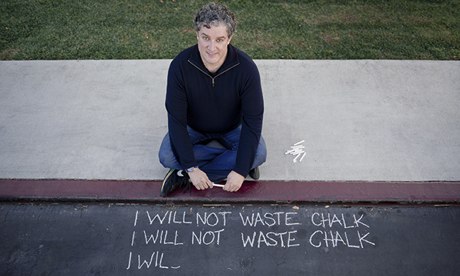
He elegido como la persona del año 2013 a Edward Snowden, por su contribución a la democracia real. Creo que lejos de perjudicar a Estados Unidos, ha destapado prácticas inaceptables contra la libertad de los ciudadanos. "No se espía a los amigos", dijo Merckel. Los gobiernos deberían colaborar en beneficio de todos. El futuro de Snowden es incierto. Espero y deseo que finalmente llegue a un pacto con las autoridades estadounidenses. Les dejo un resumen del diario "The Guardian", al que estoy suscrita y sigo. Espero que les sea útil.
Secret order compels US telecoms firm to disclose records of domestic calls
THE STORY
The
first revelation from the NSA files shows the agency continuing a controversial programme to collect the phone records ("") of millions of Americans – a scheme begun under George W Bush, but widely believed to have been scrapped by Barack Obama. The initiative, re-authorised in July and again in October, allows the agency to store details of who Americans contact, when and for how long. The agency is not, however, allowed to store the contents of calls.
THE REACTION
"Public hearings are needed to address the recent disclosures and the American people have the right to expect straight answers from the intelligence leadership to the questions asked by their representatives."
– Senator Ron Wyden
THE FALLOUT
The Obama administration releases hundreds of pages of confidential documents about the programme, showing that aspects of the surveillance had at one stage been judged unconstitutional by secret oversight courts. In July, a House amendment to remove funding from domestic phone records collection comes within 12 votes of success, surprising the press and House leadership alike. In September the secretive foreign intelligence surveillance court () declassifies its legal reasoning for approving the
NSA telephone programme periodically over the past six years.
Mass data mining from the servers of America's biggest tech companies
THE STORY
A top-secret $20m-a-year (£12m) surveillance programme, offering the agency access to information on its targets from the servers of some of the biggest American technology companies: Google, Apple, Microsoft, Facebook, AOL, PalTalk and Yahoo.

The UK eavesdropping agency has access to data. NSA documents suggest it uses Prism to access information "directly from the servers" of US companies – a claim they deny.
THE REACTION
THE FALLOUT
The leaks lead to three bills before Congress and two presidential reviews. One bill bans the collection of internet communication data and stops snooping on Americans without a warrant. Another, backed by Dianne Feinstein, proposes greater transparency and a third calls for an
end to bulk data collection and the reform of courts. Obama has set up a panel to review snooping and a separate executive review.
GCHQ taps online traffic from undersea cables and shares data with NSA
THE STORY
Britain's spy agency operates a mass-interception network based on tapping fibre-optic cables, and uses it to create a vast "internet buffer" named – a kind of Sky+ for huge amounts of data flowing in and out of the UK. GCHQ keeps the content of messages for three working days, and the for up to 30 days. The system is part of GCHQ's stated goal to "master the internet". It emerges that several major companies have given GCHQ secret unlimited access to their network of undersea cables.
THE REACTION
"We now know is routinely hoovering up and storing … the internet communications of millions of innocent people, turning us all from citizens into suspects. As far as I am aware, parliament has not sanctioned this.

Can the minister please tell the house whether this blanket snooping on all of us is authorised by a minister, and if so, under which section of which act of parliament?"
– Lord Strasburger, Liberal Democrat peer
THE FALLOUT
The legality of and is being challenged at the European court of human rights by three privacy and free expression advocacy groups: English PEN, Open Rights Group and Big Brother Watch. The government and telecoms companies are facing a separate legal challenge at the UK's investigatory powers tribunal over Tempora, brought by Privacy International. Parliament's
intelligence and security committee, which oversees , MI5 and MI6, is to investigate the extent and scale of surveillance. In parliament there have been two debates, and the heads of the three intelligence services have given evidence in public for the first time.
CRACKING CRYPTOGRAPHY
Covert NSA collaboration with tech industry to build in security defects
THE STORY
The and cracks much of the encryption technology that underpins the safety and security of the internet, protecting emails, banking, commercial transactions and official records.

The NSA's $250m-a-year project works overtly and covertly with industry to weaken security software, hardware equipment and global standards on security, with experts warning that this leaves all internet users more vulnerable. The programmes are named for the NSA, and for GCHQ.
THE REACTION
"The … is making the internet less secure and exposing us to criminal hacking, foreign espionage and unlawful surveillance."
– Christopher Soghoian, American Civil Liberties Union
"Any deliberate subversion of cryptographic systems by the is simply a bad idea, and should stop … there are plenty of other more targeted techniques they can use that do not reduce the security of the internet for all of its users."
– Economist editorial
THE FALLOUT
Companies and organisations that rely on secure, encrypted communications are looking at setting up new software and systems, distancing themselves from the government-run National Institute of Standards and Technology. One email service, Lavabit, closes down rather than hand over its encryption keys to US authorities. Owner Ladar Levison is facing court action.
CYBERWAR
President orders list of global targets to further American interests
THE STORY
Barack Obama
directs his senior national security and intelligence officials to draw up a potential target list for international cyber-attacks that will "advance US objectives around the world".

The unpublished 18-page directive states that these so-called "offensive cyber effects operations" will give "little or no warning" and would have potential effects ranging from "subtle to severely damaging". It also raises the possibility of cyber actions inside the US.
THE REACTION
Chinese media condemned Washington for its "hypocrisy", saying that Snowden's revelations had "smashed the image of the US as a cyber-liberty advocate". It added that the US had implicated Beijing in state-sponsored hacking for months.
"China has denied such attacks while defending itself as a victim of cybercrimes.
Snowden's testimony now certainly adds a dose
of conviction to the Chinese government's statements."
– China's official newswire, Xinhua
THE FALLOUT
The revelations emerge around the time of a summit between Obama and Xi Jinping when the US president confronted his Chinese counterpart about China's alleged attacks on western targets. They cause severe embarrassment to the Obama administration, as the US repeatedly accuses other countries,
particularly China, of aggressive cyber-tactics. Since the revelations those claims, and with them much of the US's diplomatic clout on the matter, are being openly questioned.
WORLD LEADERS
THE STORY
US intelligence agents track leaders' calls after being given their numbers by an official in another US government department, leaked documents reveal. Files show that the agency encourages senior officials in its "customer departments" – White House, state and Pentagon – to "share their Rolodexes" so that it can obtain contact details of foreign leaders for its surveillance systems. The revelation adds to diplomatic tensions between the US and its allies, after it is claimed that the phone of the German chancellor, Angela Merkel was tapped for 10 years.
THE REACTION
"Tampering in such a manner in the affairs of other countries is a breach of international law and is an affront of the principles that must guide the relations among them, especially among friendly nations."
– Dilma Rousseff, Brazilian president
"We need to have trust in our allies and partners, and now this must be established again. I repeat that spying among friends is not acceptable against anyone, and that goes for every citizen in Germany."
– Angela Merkel, German chancellor
THE FALLOUT
The US's standing around the world takes a huge hit as allies find out they are often the target of the 's spying operations. Rousseff cancels an official visit to the US and politicians across South American and Europe line up to criticise the extent of the snooping. Obama contacts the French president, François Hollande, to try to limit the damage, but the row reaches a new peak when Merkel phones Obama to angrily complain about the US bugging her phone.












 The UK eavesdropping agency GCHQ has access to Prism data. NSA documents suggest it uses Prism to access information "directly from the servers" of US companies – a claim they deny.
The UK eavesdropping agency GCHQ has access to Prism data. NSA documents suggest it uses Prism to access information "directly from the servers" of US companies – a claim they deny.
 Can the minister please tell the house whether this blanket snooping on all of us is authorised by a minister, and if so, under which section of which act of parliament?"
Can the minister please tell the house whether this blanket snooping on all of us is authorised by a minister, and if so, under which section of which act of parliament?" The NSA's $250m-a-year project works overtly and covertly with industry to weaken security software, hardware equipment and global standards on security, with experts warning that this leaves all internet users more vulnerable. The programmes are named Bullrun for the NSA, and Edgehill for GCHQ.
The NSA's $250m-a-year project works overtly and covertly with industry to weaken security software, hardware equipment and global standards on security, with experts warning that this leaves all internet users more vulnerable. The programmes are named Bullrun for the NSA, and Edgehill for GCHQ.
 The unpublished 18-page directive states that these so-called "offensive cyber effects operations" will give "little or no warning" and would have potential effects ranging from "subtle to severely damaging". It also raises the possibility of cyber actions inside the US.
The unpublished 18-page directive states that these so-called "offensive cyber effects operations" will give "little or no warning" and would have potential effects ranging from "subtle to severely damaging". It also raises the possibility of cyber actions inside the US.




